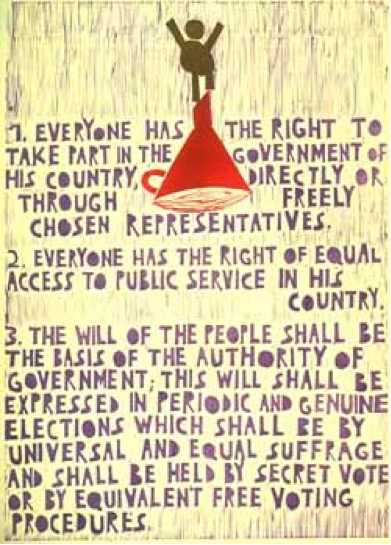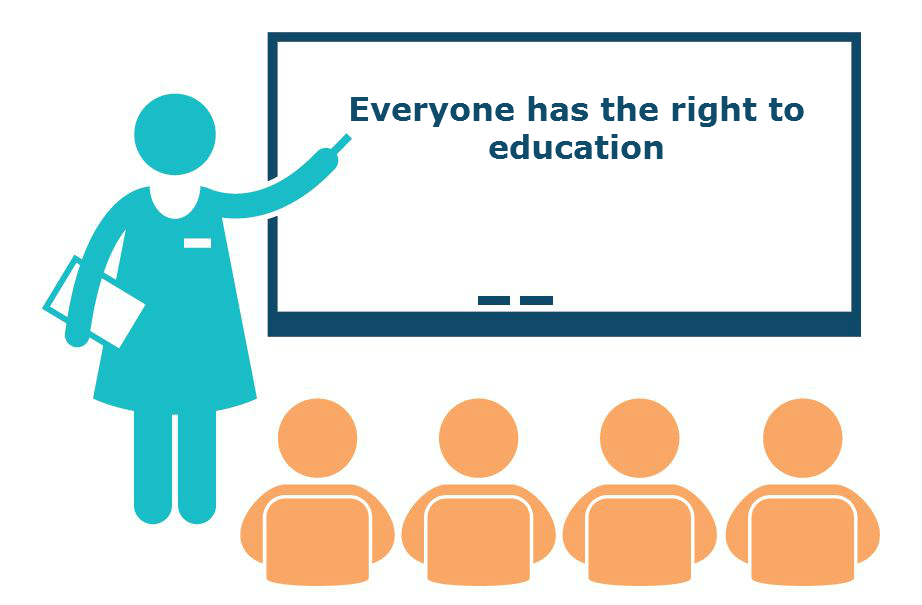INTRODUCTION TO HUMAN RIGHTS
WHAT ARE HUMAN RIGHTS ?
Every person has dignity and value. One of the ways that we recognise the fundamental worth of every person is by acknowledging and respecting their human rights.
Human rights are a set of principles concerned with equality and fairness. They recognise our freedom to make choices about our lives and to develop our potential as human beings. They are about living a life free from fear, harassment or discrimination.
Human rights can broadly be defined as a number of basic rights that people from around the world have agreed are essential. These include the right to life, the right to a fair trial, freedom from torture and other cruel and inhuman treatment, freedom of speech, freedom of religion, and the rights to health, education and an adequate standard of living.
These human rights are the same for all people everywhere – men and women, young and old, rich and poor, regardless of our background, where we live, what we think or what we believe. This is what makes human rights ‘universal’.
What do human rights cover?
Human rights cover virtually every area of human activity.
They include civil and political rights, which refer to a person’s rights to take part in the civil and political life of their community without discrimination or oppression. These include rights and freedoms such as the right to vote, the right to privacy, freedom of speech and freedom from torture.
The right to vote and take part in choosing a government is a civil and political right.
They also include economic, social and cultural rights, which relate to a person’s rights to prosper and grow and to take part in social and cultural activities. This group includes rights such as the right to health, the right to education and the right to work.
The right to education is an example of an economic, social and cultural right.
One of the main differences between these two groups of rights is that, in the case of civil and political rights, governments must make sure that they, or any other group, are not denying people access to their rights, whereas in relation to economic, social and cultural rights, governments must take active steps to ensure rights are being fulfilled.
As well as belonging to every individual, there are some rights that also belong to groups of people. This is often in recognition of the fact that these groups have been disadvantaged and marginalised throughout history and consequently need greater protection of their rights. These rights are called collective rights. For example, Aboriginal and Torres Strait Islander peoples possess collective rights to their ancestral lands, which are known as native title rights.
Rights that can only apply to individuals, for example the right to a fair trial, are called individual rights.
Why are human rights important?
Values of tolerance, equality and respect can help reduce friction within society. Putting human rights ideas into practice can helps us create the kind of society we want to live in.
In recent decades, there has been a tremendous growth in how we think about and apply human rights ideas. This has had many positive results - knowledge about human rights can empower individuals and offer solutions for specific problems.
Human rights are an important part of how people interact with others at all levels in society - in the family, the community, schools, the workplace, in politics and in international relations. It is vital therefore that people everywhere should strive to understand what human rights are. When people better understand human rights, it is easier for them to promote justice and the well-being of society.
Who has a responsibility to protect human rights?
Human rights connect us to each other through a shared set of rights and responsibilities.
A person’s ability to enjoy their human rights depends on other people respecting those rights. This means that human rights involve responsibility and duties towards other people and the community.
Individuals have a responsibility to ensure that they exercise their rights with consideration for the rights of others. For example, when someone uses their right to freedom of speech, they should do so without interfering with someone else’s right to privacy.
Governments have a particular responsibility to ensure that people are able to enjoy their rights. They are required to establish and maintain laws and services that enable people to enjoy a life in which their rights are respected and protected.
For example, the right to education says that everyone is entitled to a good education. This means that governments have an obligation to provide good quality education facilities and services to their people.
Whether or not governments actually do this, it is generally accepted that this is the government's responsibility and people can call them to account if they fail to respect or protect their basic human rights.



Good blog got more information
ReplyDeleteAmazing and informative blog👍🏻
ReplyDeleteAsaan h! Wow
ReplyDeleteInformative content 👍
ReplyDeletevery nice and infomative👍
ReplyDeleteAmazing
ReplyDeleteAwesome
ReplyDeleteInformative 👍👍
ReplyDeletenice flow of explaining
ReplyDeleteNice work 👍👍
ReplyDeleteAmhh!! Such a nice informative content💯👌
ReplyDeleteInformative🤘🏻
ReplyDeleteGreat job 👌👌👌
ReplyDeleteNice
ReplyDelete👌
ReplyDeleteAmazing
ReplyDelete👌👌
ReplyDelete👌👌
ReplyDeleteAmazing Content....keep it up✌👍
ReplyDeleteCommendable work!
ReplyDeleteGreat work 💯
ReplyDeletevery good information
ReplyDeleteVery informational and help ful
ReplyDeleteVery well presented.
ReplyDeleteVery well written
ReplyDeleteGood work
ReplyDeleteA small request, please bring more of such informative blogs.
ReplyDeleteI really got to learn alot reading it.
Good Work!
ReplyDeleteIt's high time to create awareness about our rights
ReplyDeleteVery informative 👏👏
ReplyDeleteHuman Rights are first thing anyone should spread awareness about
ReplyDeleteExcellent work 👍
ReplyDeleteGreat job 👍👌
ReplyDeleteGREAT WORK
ReplyDeleteGreat work
ReplyDeleteGreat Excellent Work.....
ReplyDelete